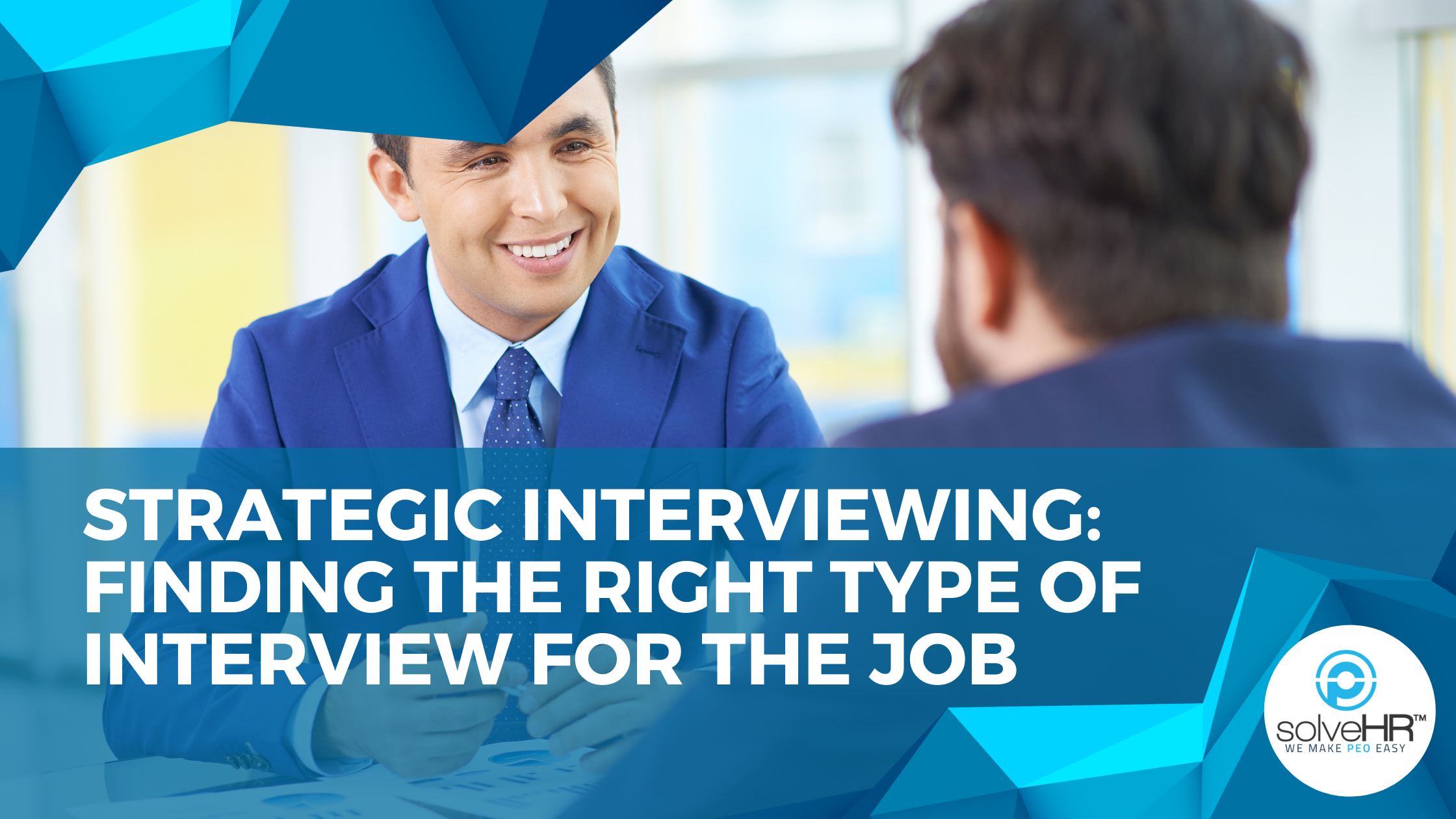Strategic Interviewing: Finding the Right Type of Interview for the Job

At this point we’ve talked about putting together an effective recruitment strategy to attract great employees as well as how to build a retention strategy to retain them, but what do we do in the middle between those steps?This is where we start to think about the interview process and what you want out of the potential candidates that you attract. An important part of being a strategic HR professional is making sure you are hiring the right talent for your organization. Therefore, understanding which type of interview is right for the position plays an important role in the process.Below we’ve outlined some key interviewing types that are sure to help you determine which one is right for your open position’s needs.Structured InterviewThis interview is based on the knowledge, skills, and abilities of the job. The questions asked are a mixture of behavioral and situational questions formed around what is required to perform the job. For example:
- Tell me about a time when you went above and beyond for a customer.
- You have a project due soon, but a team member is not pulling their weight. How would you handle this situation?
- An irate customer approaches you because a previous associate did not deliver on a promise. How would you help them?
This type of interview pairs well with jobs that require customer service skills, team building, and problem solving. Entry level positions will most likely have a structured interview. Organizations also prefer to use structured interviews because it is easier to stay compliant with EEOC laws. By providing the candidates with the same questions, it leaves less room for discrimination complaints. However, there are times when an unstructured interview can play a bigger part in selection.
Unstructured Interview
In an unstructured interview, the interviewer may or may not have prepared some interview questions for the candidate. The questions are more spontaneous, but still related to the position. For example, you may ask a question based on the candidate’s response to gain more insight on their thinking process. The job types associated with this type of interview are similar to the jobs for a structured interview.This type of interview may benefit you more if you are looking to match a person to the organization, rather than match a person to the job. Unstructured interviews give you an opportunity to get to know your candidate and see if they are a good fit for your organization’s culture. It also makes it harder for the candidate to tell the interviewer what they want to hear. By asking unique questions based on the candidate’s responses, it increases the chances of them providing an honest answer.
Stress Interview
A stress interview is designed to put the candidate under pressure or in an uncomfortable situation to provoke an emotional response. This type of interview would be beneficial if the candidate is applying for a high stress job or a job that requires the candidate to remain composed in a stressful situation.These interviews are common when hiring lawyers, journalists, law enforcement, ambassadors, and sales jobs requiring quotas. Some examples of stress interview techniques would be, asking difficult questions that might stump the candidate, or even, in some cases, acting rude to the candidate (But we strongly advise against being rude to a potential candidate).Stress interviews have been known to be controversial as of late, because they create a sensitive and emotionally charged relationship between the applicant and hiring manager, and, thereby, the company. This could potentially cause you to lose a great candidate because they were intimidated by something the hiring manger had said.Remember that the hiring process is a two-way street, and the candidate is also interviewing the company to see if they’re a good fit for their work lifestyle. If they find that the interview process was too stressful it might potentially turn them away, so approach this interview type with some degree of caution.
Problem Solving/Case Interview
This type of interview presents the candidate with a hypothetical situation or case they will need to solve. The interviewer can recall an issue that is common in the organization and evaluate the candidate’s approach to solving it. This type of interview is beneficial for candidates that are applying to be business consultants, data analysts, or executives. This can also assess your candidate’s ability to be self-efficient.Some approaches to this type of interview could be presenting the candidate with a spreadsheet that has errors, asking them to fix the errors, and make recommendations based off of the final results. Also, you can ask the candidate to present a solution to a complex situation and how they would achieve the goal.
Panel Interview
This interview is conducted by having more than one person from the organization present to interview the candidate. By consolidating the process, you will save your organization and its leader’s time. The panel will be able to ask their questions in one interview and make a more unified decision. This also adds a little pressure to the candidate to see how well they will handle it.This type of interview is most common for academic positions, board members, and government agencies. You can choose any of the above tactics to prepare questions or have a mix depending on what you are looking for in the candidate.
Experience Hassle-Free Payroll Today
Request a demo to see our services in action!

